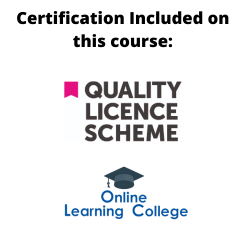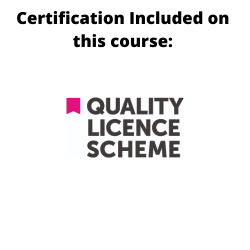Criminal Psychology Diploma Level 4
£499.00

Enrol now and start immediately!
This Criminal Psychology course can be studied in two ways; either as an additional study to a Level 3 Criminology course or with no knowledge prior to enrolment. This area of study incorporates different terms such as: Forensic, Criminological, Legal and Police Psychology; but your course will be focused on Criminal Psychology.

Quality Licence Scheme Certification included
Choose your enrolment options below

100% online
Study fully online

Start immediately
Enrol and begin today

Study in your own time
Work to your timescale

Help & support
Personal tutor to help
About this Course
| Study Time: | 120 hours |
| Enrolment length: | 12 months |
| Course Format: | Paper or Online |
| Entry Requirements: | None Specific |
The Criminal Psychology Diploma is an in depth look at the criminal mind and how it works. The course will also look at why criminals commit crime and the reasons behind criminal behaviour.
Course Introduction
There are many different sectors that deal with the psychology behind criminals, their actions and behaviours independently. Not only that but they also incorporate law, punishment and rehabilitation of convicted criminals.
Criminal psychology, also referred to as criminological psychology, is the study of the wills, thoughts, intentions and reactions of criminals and all that contributes to criminal behaviour. Which is why this course will teach you to understand how phases of a criminal’s life can affect their behaviours. We will do this by, first, assessing the bio psychosocial and developmental reasoning behind crime and the category of the crime committed. This in turn can help us understand the use of psychology in crime investigation; cultivating in a final discussion on the important bearing of psychology in the justice system.
There are four main ways Criminal Psychologists are involved in dealing with criminal proceedings.
These are the following:
Clinical: In this situation the psychologist is involved in assessment of individual in order to provide a clinical judgment. The psychologist can use assessment tools, interview or psychometric tool in order to aid in his/her assessment. These assessments can help police or other competitive organs determine how to process the individual in question. For example, help finding out whether he/she is capable to stand trial or whether the individual has mental illness which means, that he/she is unable to understand the proceedings.
Experimental: In this case the task of psychologist is to perform a research in order to inform a case. This can involve executing experimental tests for the purposes of illustrating a point or providing further information to courts. This may involve false memory, eyewitness credibility experiments and such. For example, this way questions similar to “how likely would a witness see an object in 100 meters?” will be answered.
Actuarial: This role involves usage of statistics in order to inform a case. For example, a psychologist may be asked to provide probability of an event occurring. Therefore, the courts may ask how likely a person will reoffend if a sentence is declined.
Advisory: Here a psychologist may advice police about how to proceed with the investigation. For example, which is the best way to interview the individual, how best cross-examine a vulnerable or another expert witness, how an offender will act after committing the offence.
In this course you cover an array of interesting topics; ranging from theories of crimes to the nature of actual crime committed. We look at different profiling techniques in addition to other tools used when investigating a criminal offence.
It has been argued that forensic and criminal psychology are the two sides of the same coin. Therefore, in our final course section we cover a few topics covered by Legal Psychology; which is widely considered a sub-discipline of both Forensic and Criminal psychology.
Course Content
This course assesses the following units:
Module 1: Theories of Crime (I) – Psychological
Module 2: Theories of Crime (II) – Biological
Module 3: Theories of Crime (III) – Sociological
Module 4: Theories of Crime (IV) – Developmental
Module 5: Substance Misuse (Drugs, Alcohol & Crime)
Module 6: Violence & Violent Offences
Module 7: Sex Offences
Module 8: Arson
Module 9: Stalking
Module 10: Serial Murder
Module 11: Terrorism
Module 12: Mental Health & Crime
Module 13: Offender Profiling
Module 14: Geographic Profiling
Module 15: Police Interviewing – The Suspect & The Witness
Module 16: Detecting Deception (Lie Detection, Polygraph etc.)
Module 17: Eyewitness Testimony
Method
This course comes to you as a paper course pack which you can work through in your own time. By reading through the lessons on the course and with the help of a personal tutor you will be able to learn all of the necessary knowledge required to tackle the tutor marked assignments that are used to assess the course. Alternatively, you can study for this course online to save some money on your course and study through the internet with the materials available 24/7 on any computer or smart device.
Support
A tutor will be able for support via post or e-mail, with our student support team also on hand to help with any queries you may have. Assignments must be submitted to your tutor through email and these are then marked as soon as possible.
Assessments
To pass this course learners must complete a number of assignments. These are completed after navigating through the lessons which are sent to students and writing your answers to assignment questions. Once these have been read and marked by your personal tutor, feedback and marks are provided to students which contain helpful tips to improve work in future assignments.
Quality Licence Scheme
At the end of this course successful learners will be given the option to receive a Certificate of Achievement from the Quality Licence Scheme and a Learner Unit Summary (which lists the components the learner has completed as part of the course).

The course has been endorsed under the Quality Licence Scheme. This means that Oakwood Home Learning has undergone an external quality check to ensure that the organisation and the courses it offers, meet defined quality criteria. The completion of this course alone does not lead to a regulated qualification* but may be used as evidence of knowledge and skills gained. The Learner Unit Summary may be used as evidence towards Recognition of Prior Learning if you wish to progress your studies in this subject. To this end the learning outcomes of the course have been benchmarked at the level shown against level descriptors published by Ofqual, to indicate the depth of study and level of demand/complexity involved in successful completion by the learner.
The course itself has been designed by Oakwood Home Learning to meet specific learners’ and/or employers’ requirements which cannot be satisfied through current regulated qualifications. The Quality Licence Scheme endorsement involves robust and rigorous quality audits by external auditors to ensure quality is continually met. A review of courses is carried out as part of the endorsement process.
The Quality Licence Scheme is part of the Skills and Education Group, a charitable organisation that unites education and skills-orientated organisations that share similar values and objectives. With more than 100 years of collective experience, the Skills and Education Group’s strategic partnerships create opportunities to inform, influence and represent the wider education and skills sector.
The Skills and Education Group also includes two nationally recognised awarding organisations; Skills and Education Group Awards and Skills and Education Group Access. Through our awarding organisations we have developed a reputation for providing high-quality qualifications and assessments for the education and skills sector. We are committed to helping employers, organisations and learners cultivate the relevant skills for learning, skills for employment, and skills for life
Our knowledge and experience of working within the awarding sector enables us to work with training providers, through the Quality Licence Scheme, to help them develop high-quality courses and/or training programmes for the non-regulated market
*Regulated qualification refers to those qualifications that are regulated by Ofqual / CCEA / Qualification Wales
Got some questions?
Fill out the form below to ask a question about this course and one of our course advisors will get back to you as soon as possible.
Frequently Asked Questions
Is the Criminal Psychology Diploma Level 4 course regulated?
This course is endorsed on a Quality License Scheme from ABC Awards and a certificate of completion is issued when you finish. QLS courses are not regulated by Ofqual and are used to gain evidence of knowledge and skills outside the scope of Ofqual.
What is included in the cost of the Criminal Psychology Diploma Level 4 course?
The cost of this course includes everything needed to pass. Your lessons, tutor support and certification costs are all included in the price with no additional costs at any stage. Should you wish to buy paper versions of the course materials you can do so on the checkout for £35 extra but this is optional.
What entry requirements are there for this course?
There are no entry requirements for this course at all. Anyone can study for this certification and there is no need to have any prior knowledge or experience.
How long do I have to study?
This Criminal Psychology Level 4 course has an enrolment length of 12 months included from the date you enrol. This is plenty of time to complete the assignments but you can purchase additional time for £60 per month should you need longer to finish the assignments.
Do I have to sit an exam?
No, there are no exams on this course. Everything is assessed through coursework which you can submit at any time within the enrolment length.
Am I assigned a tutor for this course?
Yes – all students are assigned to a personal tutor who will be in charge of your tuition. The same tutor marks all of your work as well as being available to answer any questions you may have throughout your enrolment period.
Do I need to be working to do the Criminal Psychology Diploma Level 4?
No, you do not need a work placement. Everything is completed online from home through written assignments and there are no practical assignments needed.
Can I speak to someone before I enrol?
Of course. Our helpful course advisors are on hand from 9am until 5pm Monday to Friday. Contact us on our online chat or by calling 0800 772 0887 to discuss this course.
Our Reviews







